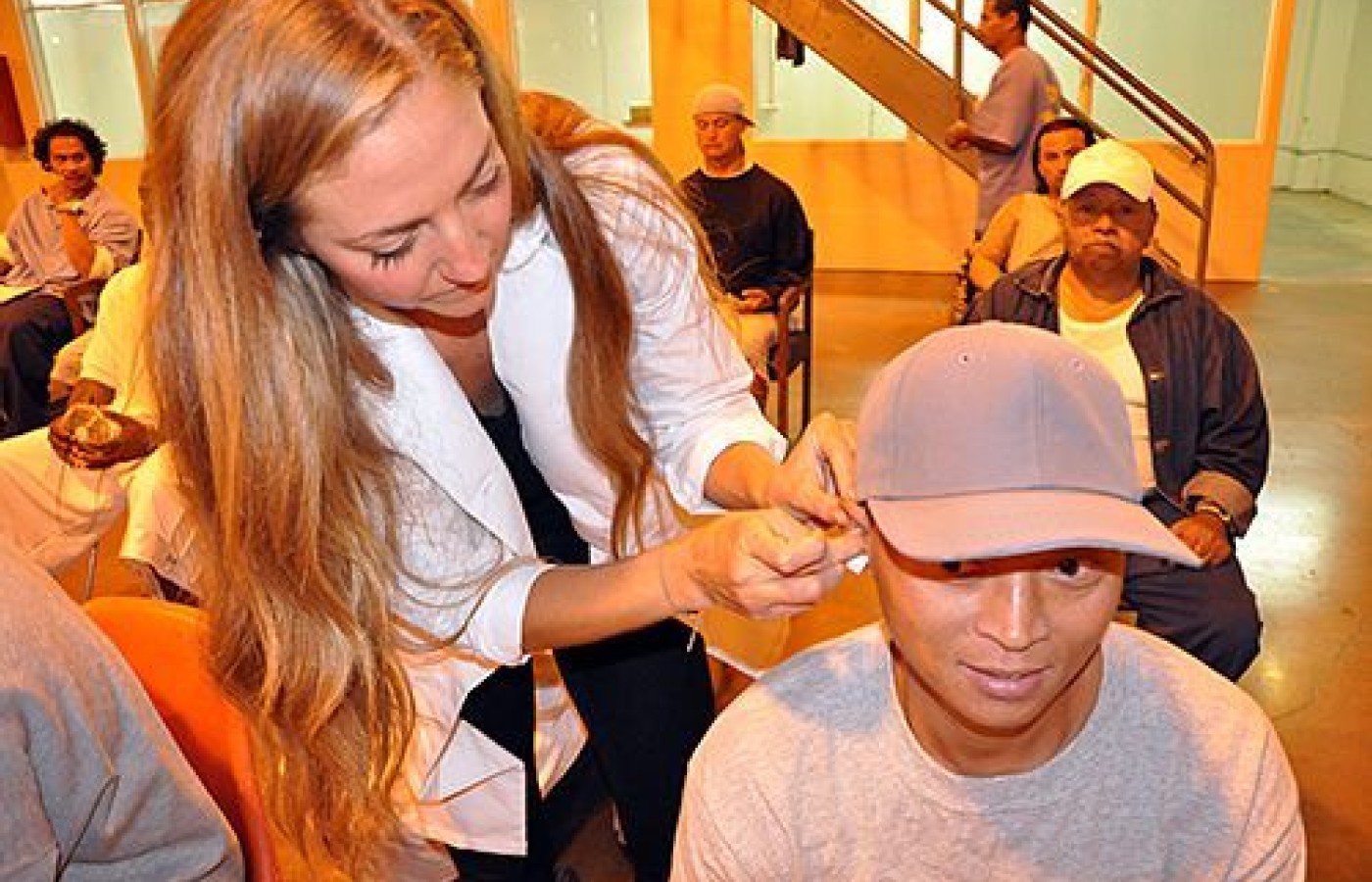The most important relationship I seek to nurture in the treatment room is the one a patient has with their own body. We live in a culture that teaches us to override pain, defer to outside authority, and push through discomfort. Patients often arrive hoping I can “fix” them, but the truth is, we can’t do the work for them. We can offer guidance, insight and support, but healing requires their full participation.
Healing With TCM at San Quentin State Prison
For the prisoners at San Quentin State Prison, life-sentences are the reality of every day life. It is not often that prisoners get the opportunity to use alternative medicine to deal with common ailments they encounter behind bars such as, depression, anxiety and pain.
On Friday, August 22, nine American College of Traditional Chinese Medicine students, one practitioner, and one administrator attended the 11th Annual Health Fair within the walls of San Quentin State Prison to assist in providing healing modalities that can help them with many of their issues. While this was the first opportunity for the ACTCM, located in San Francisco, to attend the Health Fair, as well as the first time for most participants to enter a state prison.
This small group of Master's degree students joined chiropractors, nurses, dentists, yoga and Tai Chi instructors to offer health education and services to these life-sentenced inmates on a rare, once-per-year basis.
When you first enter San Quentin, the first thing everyone sees is a big, open courtyard surrounded on one side by various types of religious headquarters – everything from Muslim, Native American, and Christianity is represented. On the other side of the courtyard is a building called "The Adjustment Center" and Death Row, the only one existing California, sits just beyond. San Quentin is a medium security prison so it is not uncommon to see inmates walking around the grounds on their own, going to classes, work, or the dining hall. On the day of the health fair, most inmates were already lining up at 8 a.m. in anticipation of the many services they were about to be provided.
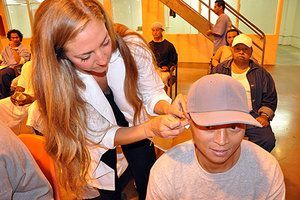
For this group of Western and alternative medicine practitioners, the day started at 7 a.m. with a security check-in at the San Quentin visitor's center. All participants had to abide by a strict, and rather confusing, dress code. No blue, orange, yellow, green, grey, or denim, no white tops with white pants, no political logos, no open toe or backless shoes, no tank tops under shirts, no layering and no facial jewelry. Surprisingly, even with the limited dress possibilities, everyone was admitted and made their way to orientation, which was led by the inmate organizers and San Quentin support staff.
After orientation, which consisted mainly of presentations on prison code of conduct and schedule logistics as well as complimentary pastries and coffee, the ACTCM group was led through the lower yard to the gym, witnessing the heart of the prison where thousands of inmates can be found working out, playing chess, reading and conversing. This is often the most intimidating part of a prison visit yet everyone involved acted kindly, respectfully and seemed enthusiastic to see so many new faces. Once ACTCM made it to the gym, they were led to the back part, where over 50 chairs had been set up with two tables and 2-4 inmates designated to help keep things running smoothly for the day.
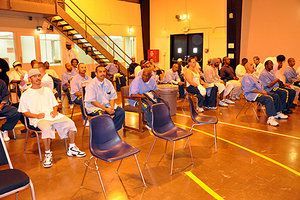
At 10 a.m. sharp, the doors opened and the 50 chairs slowly began to fill until there was a new line snaking around the gym with inmates waiting for their first acupuncture treatment.
Instead of using needles for safety reasons, ACTCM students provided ear acupuncture seeds to accommodate each inmate's chief complaints. Of the almost 400 male patients treated over a four-hour period, the most common complaints included: stress, anxiety, insomnia, depression, pain (back, neck, head, shoulder), anger, trauma, testicular issues, and toothaches. One student noted that two different inmates asked for help with "a broken heart." Receiving auricular acupuncture was a new experience for these inmates, and the student practitioners found them to be both curious to learn about how they work and open to the process. The students explained to each patient how to rub the seeds during times of ailment, anger, anxiety, or whatever it was that they intended for each seed to address. While ear seeds are not a "magic pill" to the problems these inmates face, patients are encouraged to continue to rub their ears, teaching them that in TCM the ears are by themselves a microcosm of the whole body and that daily massage can have a long-term calming and nourishing effect on the body.
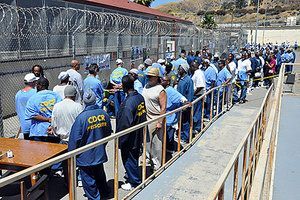
Since the health fair, feedback from the inmates, received via prison volunteers and staff, has been extremely positive. Most inmates kept their seeds in for 3-5 days, avoiding washing their ears and continually rubbing the seeds. Many inmates said that their pain completely went away after a few days. Another mentioned he is sleeping better and feels better mentally and emotionally. A very relieved and shocked patient said that after years of having hyperhidrosis (excessive hand sweating) and needing to wear plastic bags on his hands to write or eat, he is completely better. These stories, among many others, illustrate the power and beauty of acupuncture, a medicine that truly changes the lives of people from all walks of life.
This experience had a profound impact on the students. Within the time that they were treating patients, most forgot they were in a prison. The gentlemen were calm, respectful, and on their own path of making deeper, personal changes. Many disclosed more details of their own journeys. One quote that struck a student the most was when a gentleman looked at her straight in the eyes after his treatment and said, "Thank you for looking at me with compassion and treating me like a human being."
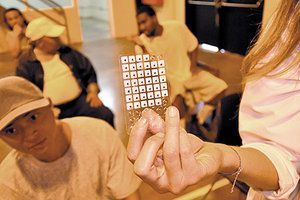
While the details of the individual crimes are unknown, this powerful exchange and many others are a strong reminder that there is far more that people have in common than the perceived differences and judgments that too often divide us. It is not our mistakes that should define us as individuals, but the courage we find within ourselves to discover a different path focused on healing and serving others. These gentlemen demonstrated the analogous power of TCM, which allows us to enhance our own natural, powerful healing abilities. It reminds us of our power within, and that the solution, more often times than not, does not lie outside of ourselves. The modalities used in TCM, and emphasized at ACTCM, encourage our own innate healing abilities to bring us back to balance, and ultimately, to inner peace. Many of the men at San Quentin State Prison are taking their first bold and courageous steps to recognize their inner strength, and actively transforming this into personal transformation.
